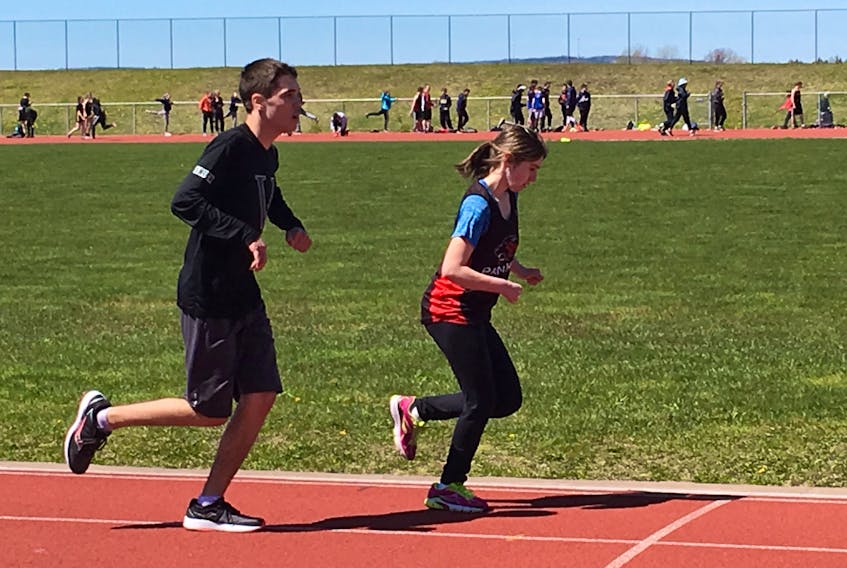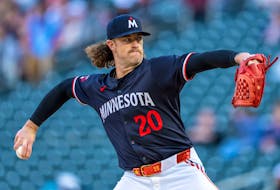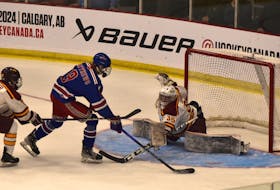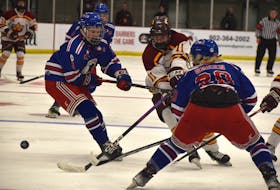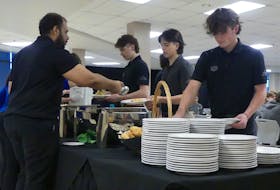AMHERST, N.S. — Quentin Knock is proud to wear the green and gold of the Amherst Regional High School track and field team, but he’s disappointed and frustrated his success on the track has not been recognized by the Nova Scotia Schools Athletic Federation.
The 18-year-old Grade 12 student has been competing in para events at the district, regional and provincial level for several years, but despite winning multiple gold medals in the 200 and 800-metre races and the shot put his points haven't counted toward the school’s total in the competition for the provincial championship banner.
It’s something, he said, that had made him feel like he’s less a member of the team.
“It’s made me sad because it felt like I was not an athlete who’s contributing to my team’s success,” Knock said Wednesday. “It’s really frustrating because I just want to help my team.”
While the NSSAF had refused to include the points accumulated by para and special athletes in their schools’ total points, its executive director Stephen Gallant said Wednesday it has come up with a short-term solution while it works on a longer term plan that will be brought forward at the federation’s fall meeting in September.
“We’re going to introduce a new banner for this year and it’s going to be Chairman’s Excellence Award,” Gallant said. “What it’s going to be is for schools that participate in two of the three categories we offer, including the main draw, the para events or the special athlete events. We’re going to take the aggregate points from across the meet, including the points from those events, and present a banner to the school that achieves the most points.
“We’re addressing the short-term and certainly looking long term as well. We’re going to involve track folks, school officials and everyone who needs to be involved so we can take something to our board in September to hopefully resolve this permanently.”
Like at regionals May 23 and 24, there won'tt be overall team championship banners in each of the divisions at provincials. There will be a banner for the top region in each division.
Knock said he’s pleased with the NSSAF decision, but feels there’s still work to be done.
“I’m happy with it and it shows that it’s moving along,” he said. “It’s frustrating it took this long because last year was a mess and I’ve been thinking about it all year.”
He hopes the NSSAF will fully recognize para athletes so it encourages more athletes to represent their schools.
“Being part of a team is what track and field is all about. Yes, it’s individual sports, but it’s a team sport too because the points you earn help your team and your school,” he said.
Knock’s mother, Vanessa, is thanking everyone in the community and across the province that responded, including those who filled out a petition in favour of para and special athletes. However, she said the job’s not done and she’s going to hold the governing body for school athletics to its word.
“This is a good first step and a positive step, but last weekend they gave out banners for senior boys that my son couldn’t contribute to,” she said. “Still, they are still discriminating. I still feel they could’ve had all the steps in place. I just think they’re reacting because they have had all sorts of people putting pressure on them. Parents, principals and people in general didn’t know that para and special athletes were not getting points.”
While Quentin graduates in June, she will not stop putting pressure on the NSSAF to make real change. Her son is also continuing with filing a complaint with the Nova Scotia Human Rights Commission.
“The NSSAF, besides being in violation of the Nova Scotia Human Rights Act that says you have to treat people equally even if they have a disability, is contributing to ableism where Quentin’s peers don’t see him as equal to them,” she told the Amherst News on Tuesday, when first interviewed. “Also, we’ve noticed almost unanimously, all the para athletes come from the Chignecto-Centre Regional Centre for Education.
“What are we saying about our province and being included? These students are already marginalized. We know that we have an inclusion policy for education in Nova Scotia, but education doesn’t stop with books.”
She said she started asking questions about the process when Quentin first got involved in athletics. Last year, she and the parents of other para athletes lodged complaints to the NSSAF and were told it would be addressed before the end of 2018.
In early May they were told the answer was no.
She wants everyone treated equally, whether they’re a para athlete, a special athlete or able-bodied athlete.
“Other people may not understand, but when your child starts out at a pound-and-a-half and then you get to leg races to help him walk and now he’s running faster than you can, it’s heart-breaking that he’s left out,” she said.
Gallant appreciates and welcomes the contribution of para athletes. In an interview Tuesday, he said, the issue has been there haven't been enough para athletes for a provincial competition.
“Right now, we have five para students, three boys and two girls,” Gallant said, adding they’re all in one region. “To have a race, you need multiple people in every category and at the moment you have three boys and two girls.”
Gallant said the para division just started three years ago and the NSSAF is working to get schools to encourage more para students to participate.
On Wednesday, he said, there are more than 20 special athletes across the province that have qualified for the provincials through the district and regional meets. They will be included with the para athletes and other student athletes in competition for the chairman’s award.

